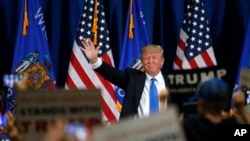Americans return to the polls for yet another presidential primary election in what has proven the most chaotic Republican contest in recent memory, with front-runner Donald Trump now pushing rival John Kasich to leave the White House race saying the nomination is beyond his grasp.
Trump, who is badly trailing Texas Sen. Ted Cruz in the polls ahead of Tuesday's primary in the Midwestern state of Wisconsin, argues that Kasich is unfairly siphoning off delegates who will select the party's candidate for the November general election. Trump holds a significant lead over Cruz in primaries and caucuses so far, but looks as though he will be unable to gain the 1,237 delegates needed to lock up the nomination ahead of this summer's national convention in Cleveland.
Trying hard to right himself after a difficult week, Trump said it was unfair for Kasich, who has won only one primary in his home state of Ohio, to continue campaigning. He suggested that Kasich, who has pledged to make it to the convention, follow the lead of former candidates Marco Rubio and Jeb Bush - and quit.
"If I didn't have Kasich, I automatically win,'' Trump said Sunday evening in Wisconsin.
Trump said Kasich could ask to be considered at the Republican convention even if he stopped competing in the remaining nominating contests. He said earlier Sunday that he had shared his concerns with Republican National Committee officials at a meeting in Washington last week.
Kasich's campaign countered that neither Trump nor Cruz would have enough delegates to win the nomination outright. Trump faces major opposition in the mainstream of the party where he is seen as running an outlandish campaign that will make him unelectable in November.
"Since he thinks it's such a good idea, we look forward to Trump dropping out before the convention,'' said Kasich spokesman Chris Schrimpf.
Across the political aisle, Democrat Hillary Clinton told NBC's "Meet the Press'' that the FBI had yet to request an interview regarding the private email server she used as secretary of state.
Clinton and her Democratic opponent, Vermont Sen. Bernie Sanders, announced they'd agreed to debate in New York before the important April 19 primary, though their campaigns continued debating over when to schedule the face-off. Sanders, meanwhile, fired up a crowd in Wausau, Wisconsin, hoping to continue a string of recent campaign victories even as Clinton maintains a sizable delegate lead.




